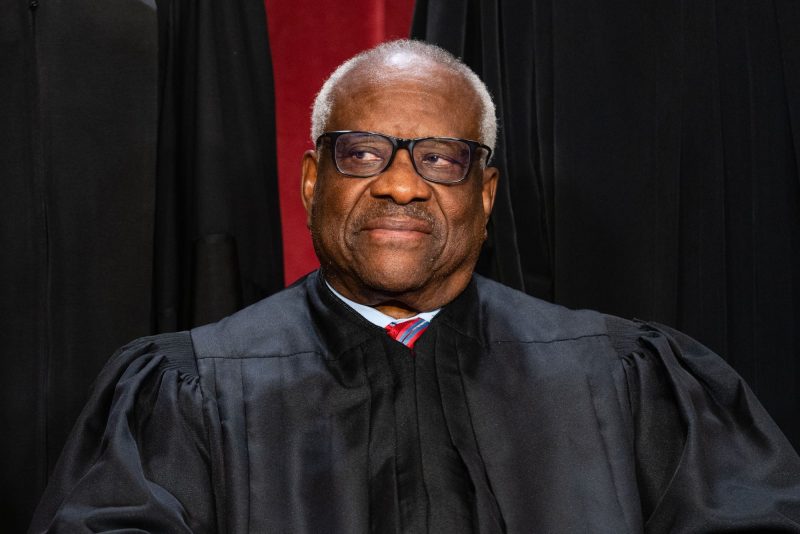
Parsing Clarence Thomas’s statements on the gifts he didn’t disclose
In a rare public comment, Supreme Court Justice Clarence Thomas responded to a blockbuster ProPublica report that he had accepted luxury trips around the globe from a Dallas business executive and influential GOP donor. Here’s a parsing of each line in the carefully worded statement.
“Harlan and Kathy Crow are among our dearest friends, and we have been friends for over twenty-five years.”
Thomas was appointed to the Supreme Court 32 years ago, so this friendship between the justice and Harlan Crow developed after he joined the court. ProPublica reported that “the pair have become genuine friends, according to people who know both men.” The article said “Crow has spent millions on ideological efforts to shape the law and the judiciary.”
“As friends do, we have joined them on a number of family trips during the more than quarter century we have known them.”
The ProPublica article documented some of these trips, including a nine-day journey in Indonesia on a private plane and superyacht that would have cost Thomas more than $500,000 if he had funded it himself. As a Supreme Court justice Thomas earns $285,000 a year.
Notably, Thomas’s statement does not address his use of Crow’s private plane for other reasons.
“Flight records from the Federal Aviation Administration and FlightAware suggest he makes regular use of Crow’s plane,” the ProPublica article said. “The jet often follows a pattern: from its home base in Dallas to Washington Dulles Airport for a brief stop, then on to a destination Thomas is visiting and back again.” For instance, in 2016, he used Crow’s plane for a three-hour trip to New Haven. Jet charter companies told ProPublica that “renting an equivalent plane for the New Haven trip could cost around $70,000.”
“Early in my tenure at the court, I sought guidance from my colleagues and others in the judiciary, and was advised that this sort of personal hospitality from close personal friends, who did not have business before the court, was not reportable.”
This statement is vague, not disclosing when he sought this guidance (such as whether it was before or after he became friends with Crow) and who outside the Supreme Court but “in the judiciary” might have offered this guidance.
“Crow and his firm have not had a case before the Supreme Court since Thomas joined it, though the court periodically hears major cases that directly impact the real estate industry,” ProPublica said. “The details of his discussions with Thomas over the years remain unknown, and it is unclear if Crow has had any influence on the justice’s views.”
The statement also sidesteps the question of whether Crow puts Thomas in contact with people who might have pending matters before the court. Thomas frequently visits Crow’s lakeside resort, Camp Topridge, in New York. “Crow’s access to the justice extends to anyone the businessman chooses to invite along,” ProPublica said. “Thomas’ frequent vacations at Topridge have brought him into contact with corporate executives and political activists.” In a statement, Crow told ProPublica he is “unaware of any of our friends ever lobbying or seeking to influence Justice Thomas on any case, and I would never invite anyone who I believe had any intention of doing that.”
“I have endeavored to follow that counsel throughout my tenure, and have always sought to comply with the disclosure guidelines.”
This is debatable. In 2004, the Los Angeles Times disclosed that Supreme Court Justice Clarence Thomas had accepted from Crow private plane trips and expensive gifts, such as a Bible that once belonged to abolitionist Frederick Douglass and a bust of Abraham Lincoln.
The Bible was valued by Thomas at $19,000 and the bust at $15,000. The Times said that, under a 1978 ethics law, Thomas had reported receiving the most gifts of any justice in a six-year period ending in 2003. Thomas also reported accepting a free trip aboard Crow’s private jet to the exclusive Bohemian Grove club in Northern California.
The Los Angeles Times noted that Crow in 2001 had donated $175,000 for the wing named in Thomas’s honor at his childhood library in Georgia. “Crow was a national board member of the Center for the Community Interest, an advocacy group that filed amicus briefs with the Supreme Court espousing conservative views on cases involving such issues as crime and pornography,” the 2004 article said.
Thomas refused to comment in 2004, but the Times report appears to have had an impact: Thomas stopped disclosing that he had accepted free plane trips from Crow. So it’s unclear how Thomas can say in recent years he relied on the same guidance he had received “early in my tenure.”
“These guidelines are now being changed, as the committee of the Judicial Conference responsible for financial disclosure for the entire judiciary just this past month announced new guidance. And, it is, of course, my intent to follow this guidance in the future.”
Thomas is correct in that the rules have recently been tightened. Gifts such as an overnight stay at a personal vacation home owned by a friend remain exempt from reporting requirements. But the revised rules require disclosure when judges are treated to stays at commercial properties, such as hotels, ski resorts or other private retreats owned by a company, rather than an individual. The changes also clarify that judges must report travel by private jet.
(About our rating scale)
Send us facts to check by filling out this form
Sign up for The Fact Checker weekly newsletter
The Fact Checker is a verified signatory to the International Fact-Checking Network code of principles
